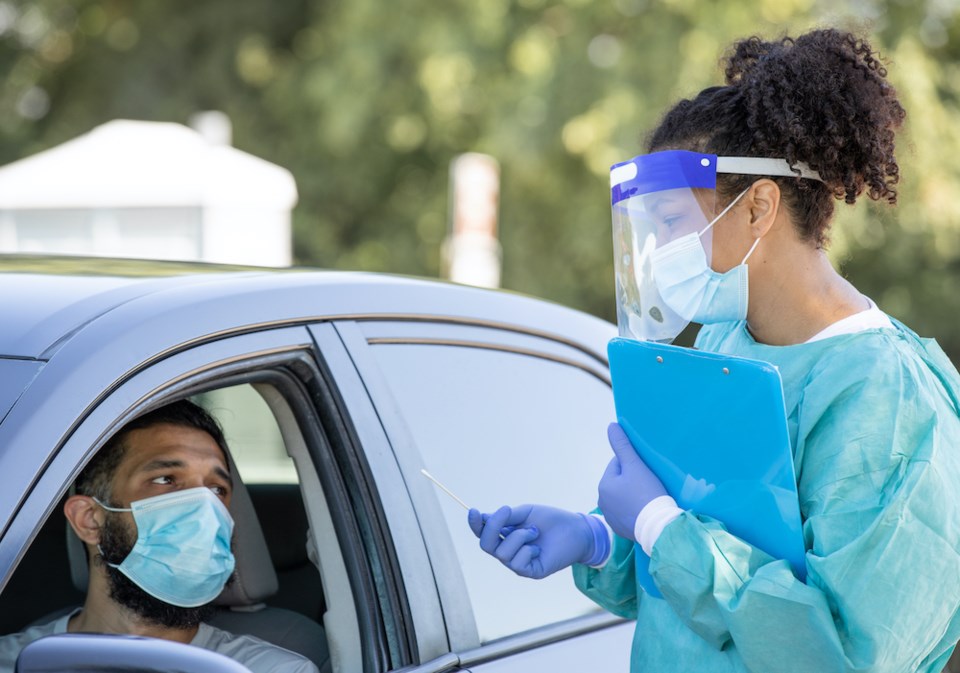If you've felt a tickle in your throat sometime in the last nine months, you've probably wondered, at least for a second, if it was COVID-19.
One of the trickiest features of the novel coronavirus, for both health officials and the general public, is just how differently the virus can present in individuals. In some cases, it's deadly, while other people can be infected and not experience so much as a single symptom. The noticeable symptoms most frequently experienced by those who test positive for COVID-19 run the gamut between those two extremes.
To that end, it's crucial to pay attention to how we're feeling and to be aware of what all the possible symptoms of the virus are, said B.C. Provincial Health Officer Dr. Bonnie Henry during Thursday's COVID-19 briefing.
While B.C.'s testing capacity is no longer the subject of major discussion, nor is it as limited as it was in the pandemic's earliest days, it can still be difficult to determine which circumstances, exactly, warrant a COVID-19 test. As the winter solstice approaches and other respiratory viruses begin floating around the community, the province has updated its guidelines about when British Columbians should seek out a COVID-19 test.
When to get a COVID-19 test in B.C.
“Here in B.C., the majority of new cases continue to be directly connected to known, confirmed cases of COVID-19," Henry explained. "As a result, if you are a close contact of someone with the virus or of someone who is part of a cluster or outbreak and you develop any symptoms, you should arrange to get tested immediately."
To be considered a close contact, individuals must have spent more than 15 minutes with the person who has tested positive, during the time spanning from 48 hours before they developed symptoms to 10 days after. You may have, according to the B.C. Centre for Disease control.
It's in circumstances where someone hasn't knowingly been around anyone with COVID-19 that the decision about whether to get a test becomes murkier. Those are the guidelines the province has updated, in an effort "to make it clearer for everyone," said Henry.
"This is because we know many COVID-19 symptoms are similar to influenza or colds."
As Henry explained, there are four key symptoms that have been proven to be most associated with or predictive of COVID-19: fever or chills, cough, loss of sense of smell or taste, and difficulty breathing.
If you're experiencing any one of these symptoms, you should seek out a COVID-19 test right away, Henry said.
When you can wait to take a COVID-19 test
It's in circumstances where an individual might be experiencing another symptom of COVID-19 outside of those core four that you can hold off on an immediate test, Henry continued.
While symptoms like sore throat, loss of appetite, extreme fatigue, headache, body aches, nausea, vomiting or diarrhea have been observed in some individuals who've contracted COVID-19, they're just as likely to be associated with a number of other common viruses and conditions.
That's why “If you have one or two of any of the other symptoms, you can wait 24 hours," Henry advised. However, if those 24 hours pass and you feel the same or worse, then you should be tested as soon as you can.
Testing is not recommended for anyone who is not experiencing any symptoms, even if they are a close contact of a COVID-19 patient. In fact, testing is generally not available through B.C.'s provincial health care system for people without symptoms, including routine screening for employment, travel, school, before surgery or for other health procedures, according to the BCCDC.
A person with one or more mild symptom can choose to seek COVID-19 testing, even when it's not required.
If anyone is uncertain as to whether their symptoms warrant a test, British Columbians are encouraged to contact their health care provider or call 811 for advice.
If you do receive a test, you must self-isolate while you wait for the result to come back. That's to ensure you don’t potentially spread COVID-19 to others, before you know for sure whether or not you've contracted the virus.



